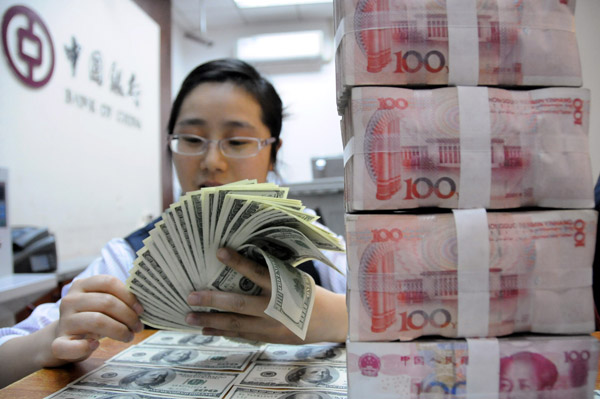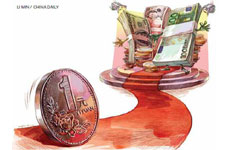Renminbi weakens for sixth day
By LINJING in Hong Kong (China Daily) Updated: 2014-02-26 03:58
 |
|
A clerk counts currency at a Bank of China Ltd branch in Nanchong, Sichuan province. The yuan has depreciated almost 1 percent against the dollar since Feb 17. [Photo/Xinhua] |
Economists say the central bank wants to lower expectations for further gains
The yuan closed at 6.1266 against the dollar on Tuesday, down 0.46 percent overnight, the largest decline since Nov 1, 2010, according to the China Foreign Exchange Trade System.
The currency is down almost 1 percent against the dollar since Feb 17.
 |
Economists said that the People's Bank of China is engineering the easing to lower expectations of further appreciation.
"The PBOC has adjusted the median rate higher, prompting market expectations of depreciation," said Raymond Yeung, greater China senior economist for Australia and New Zealand Banking Group Ltd.
He said the latest economic statistics are also dampening market confidence in this year's performance by the Chinese economy.
The Markit/HSBC Purchasing Managers' Index is expected to fall to 48.3 in February from 49.5 in January, the lowest since July last year. A number below 50 indicates contraction.
Since July 2005, when China began liberalizing the exchange rate, the yuan has gained about 35 percent against the dollar.
Chen Xingdong, chief economist at BNP Paribas, said that in the past year the currency's appreciation has hurt China's exports.
Chen said the PBOC is trying to take advantage of the US Federal Reserve Board's tapering policy to buy more dollars, which is weakening the yuan.
Chen dismissed the idea of a huge decline in the yuan and forecast the daily trading band will be widened to 2 percent.
The band, which is 1 percent at present, was last widened from 0.5 percent in April 2012.
Yeung said that the yuan's weakness is temporary and appreciation will resume, although the exchange rate will be more volatile.
He added that this round of depreciation may end before the "two sessions", the annual meetings of legislators and policy advisers in Beijing. Those meetings are scheduled to start in the first week of March.
He said he expects positive policies to emerge from the meetings, which will further influence the yuan's value.
ANZ has forecast the exchange rate will pierce the threshold of six yuan per dollar in the second half of this year and reach 5.92 by year-end.
Albert Chan, managing director in the banking industry practice of consultancy firm Accenture Plc, said that the yuan will continuously appreciate against the dollar as part of its internationalization.
"It's believed that the yuan needs to be progressively allowed to appreciate to be close to its true value," said Chan.
He said the exchange rate will fall below six yuan per dollar and, in the long run, the stronger Chinese currency will generate inflation in Hong Kong.
"Given that the Hong Kong dollar is pegged against the US dollar, the yuan's rate against the Hong Kong dollar will further rise," he said.
Large-scale imports from the mainland, combined with rising investment and spending by an influx of mainland tourists, will bring inflation to the special administrative region.
- NHTSA says finds no 'defect trend' in Tesla Model S sedans
- WTO rare earth ruling is unfair
- Amway says 2014 China sales may grow 8%
- President Xi in Europe: Forging deals, boosting business
- CNOOC releases 2013 sustainability report
- Local production by Chery Jaguar Land Rover this year
- Car lovers test their need for speed in BMW Mission 3
- China stocks close mixed Monday

















